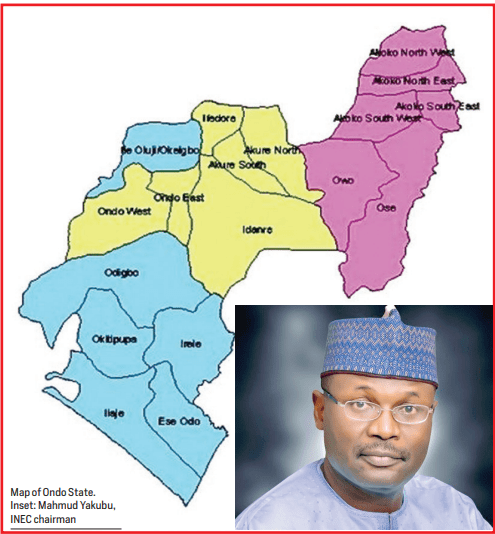Reflecting on the 1983 governorship election in Ondo State evokes memories of a political episode that would go down in history as one of the darkest moments in the state’s political landscape.
That election was marked by turbulence, bitterness and eventual violence, leaving the entire region reeling. As we approach another crucial election in 2024, it’s essential to consider the past to ensure that history does not repeat itself.
This reflection aims to uncover what happened, why it occurred, and how we can avoid similar outcomes as Ondo State moves toward a new chapter.
In 1983, the governorship election in Ondo State was not just a contest between political parties; it was a clash between powerful political titans and their ideologies.
Chief Michael Adekunle Ajasin, a respected leader and candidate from the Unity Party of Nigeria (UPN), was seeking re-election against Akin Omoboriowo, who had defected to the National Party of Nigeria (NPN) after initially being part of the UPN.
Ajasin had achieved significant strides in education, health and social infrastructure during his first term, and he had earned a strong base of supporters across Ondo State. However, Omoboriowo, known for his charisma and political savvy, was determined to challenge Ajasin’s hold on power.
The 1983 election became a high-stakes competition fueled by intense emotions and fierce loyalty to political camps. Unfortunately, the rivalry between Ajasin and Omoboriowo escalated into deep-seated resentment, creating a tinderbox situation that would soon ignite.
When the election results were announced, the NPN declared Omoboriowo the winner under what many believed were dubious circumstances. Ajasin’s supporters were shocked, alleging widespread electoral manipulation and a stolen mandate. Their anger and frustration boiled over, resulting in widespread protests, riots and destruction.
Ondo State plunged into chaos as supporters of both camps clashed on the streets, setting buildings ablaze, blocking roads and attacking political opponents.
The violence led to countless deaths, property destruction, and displacement, leaving scars that would take years to heal. It was a cautionary tale about the consequences of disputed elections and unchecked political ambitions.
The 1983 crisis marked a major setback for democracy in Ondo State and set a precedent for electoral violence in Nigeria. Ajasin filed a petition, asserting that the election had been marred by widespread fraud, and brought his case before the Justice Orojo Tribunal, a panel specifically set up to investigate the matter.
After carefully examining the evidence and testimonies, the Justice Orojo Tribunal ruled in favour of Ajasin, invalidating Omoboriowo’s victory and declaring Ajasin the rightful winner. The Supreme Court upheld the Justice Orojo Tribunal’s ruling, affirming that Ajasin was the legitimate winner of the 1983 election.
This landmark decision validated the electoral process and confirmed the judiciary’s role as a check against electoral fraud. The ruling was celebrated as a victory for democracy and the rule of law, but the damage had already been done in Ondo State.
Despite the judicial outcome, the violence and chaos that followed the contested election left a lasting impact on the community and paved the way for the eventual military coup of December 31, 1983. The memory of 1983 remains vivid in Ondo State.
The trauma experienced by families who lost loved ones and property still lingers in the community psyche. As Ondo prepares for the 2024 elections, there are many reasons why a repeat of the 1983 scenario must be avoided. The 1983 election should serve as a powerful reminder of the damage that political divisions and electoral fraud can inflict.
The lives lost, the destruction witnessed, and the setbacks to development must motivate all stakeholders to prioritise peace and transparency. One major issue in 1983 was the manipulation of electoral outcomes.
In 2024, it is imperative that the Independent National Electoral Commission (INEC) and other agencies tasked with overseeing the election uphold the highest standards of transparency and accountability. Free and fair elections are crucial for preventing post-election violence and ensuring the public’s faith in democracy.
The political Leaders should be discouraged from inciting violence, spreading misinformation, or encouraging voter manipulation. Civil society organisations, the media and the general public need to remain vigilant and be ready to expose any attempts by politicians to undermine the election’s integrity. Peace in Ondo State must be a shared responsibility.
All stakeholders – politicians, voters, security agencies, and civil society organisations – must come together with the goal of ensuring that the election is free, fair, and peaceful. The involvement of traditional and religious leaders could also play a critical role in defusing tensions and promoting mutual respect among communities.
Each individual, whether casting a vote or standing on the sidelines, has a duty to uphold the democratic process. Tolerance and mutual respect must replace the animosities that tore the state apart in 1983. The 1983 governorship election in Ondo State stands as a cautionary tale of how high-stakes politics can devolve into violence and chaos.
The loss and trauma from that era serve as a painful reminder of the consequences of unchecked political rivalry and mistrust. As Ondo State prepares for Saturday’s election, it is crucial that the lessons from the past are fully absorbed.
Ondo State can and must avoid a repeat of 1983 and instead emerge as a beacon of democratic maturity in Nigeria. By remembering the past, we can protect the future and ensure that the Ondo governorship election is marked by peace, progress and unity.















